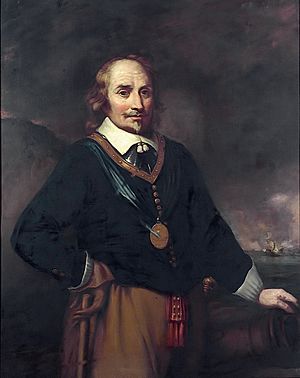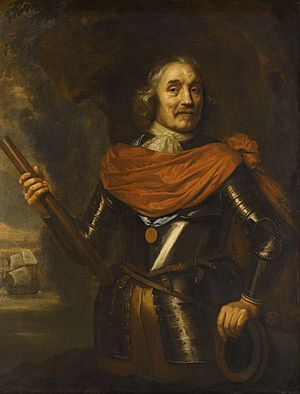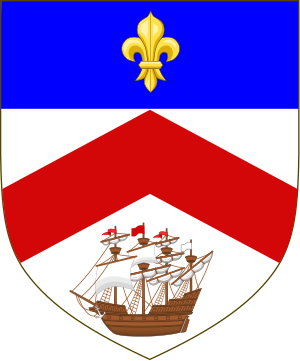Maarten Tromp facts for kids
Quick facts for kids
Maarten Tromp
|
|
|---|---|

A portrait of Tromp by Jan Lievens.
|
|
| Birth name | Maarten Harpertszoon Tromp |
| Nickname(s) | Bestevaêr |
| Born | 23 April 1598 Brielle, Dutch Republic |
| Died | 31 July 1653 (aged 55) Battle of Scheveningen |
| Buried |
Oude Kerk, Delft
|
| Allegiance | |
| Years of service | 1607–1653 |
| Battles/wars | Eighty Years' War |
| Signature |  |
Maarten Harpertszoon Tromp (born 23 April 1598 – died 31 July 1653) was a famous Dutch admiral and army general. He spent most of his life at sea, becoming a hero for the Dutch Republic.
Tromp led Dutch forces during important wars. He fought in the Eighty Years' War for Dutch independence and later against England in the First Anglo-Dutch War. He was known for his clever battle plans and helped the Netherlands become a strong sea power. Sadly, he was killed in battle by a sharpshooter from an English ship. Many ships in the Royal Netherlands Navy have been named HNLMS Tromp in honor of him or his son, Cornelis Tromp, who was also a well-known admiral.
Early Life and Adventures
Maarten Tromp was born in Brielle, a town in the Dutch Republic. He was the oldest son of Harpert Maertensz, who was a naval officer and a ship captain. Maarten started sailing with his father when he was only nine years old. He was even present during the Battle of Gibraltar in 1607, where the Dutch fleet fought.
In 1610, when Maarten was 12, his father's merchant ship was attacked by pirates. During the fight, his father was killed. The pirates captured young Maarten and sold him into slavery in Salé. After two years, the pirate leader felt sorry for him and ordered him to be set free.
Once free, Maarten worked in a shipyard in Rotterdam to help his mother and sisters. At 19, he went back to sea, but was captured again in 1621, this time by Barbary corsairs near Tunis. He was a slave for three more years. He impressed his captors with his sailing and gun skills. They even offered him a job in their fleet, but he refused. Because of his strong character, they let him go as a free man.
In 1622, he joined the Dutch navy as a lieutenant. He quickly became a captain. He was known for fighting against the Dunkirkers, who were privateers (like legal pirates) from Dunkirk.
Leading the Dutch Fleet
In 1637, Maarten Tromp became a Lieutenant-Admiral. This meant he was the main commander of the Dutch fleet, even though the official leader (the stadtholder) never actually fought at sea. Tromp's main job was to block the port of Dunkirk, which was a base for privateers.
In 1639, during the Eighty Years' War (when the Dutch fought for independence from Spain), Tromp won a huge victory. He defeated a large Spanish fleet at the Battle of the Downs. This battle was very important because it showed the end of Spain's power at sea. In this battle, Tromp was one of the first naval commanders to use a new tactic called the "line of battle." This meant his ships formed a long line to fire all their cannons at the enemy. His main ship at this time was the Aemilia.

When the First Anglo-Dutch War started in 1652, Tromp led the Dutch fleet in many major battles. These included the battles of Dover, Dungeness, Portland, the Gabbard, and Scheveningen.
During the Battle of Scheveningen in 1653, Maarten Tromp was tragically killed. A sharpshooter from an English ship shot him. His acting captain, Egbert Bartholomeusz Kortenaer, kept Tromp's flag flying on their ship, the Brederode. This helped keep the morale of the Dutch fleet high, as they thought Tromp was still alive.
Tromp's death was a big loss for the Dutch navy. After his death, the Dutch Republic began peace talks with England, which led to the Treaty of Westminster. Another admiral, Jacob van Wassenaer Obdam, took over as the supreme commander of the Dutch fleet.
See also
 In Spanish: Maarten Harpertszoon Tromp para niños
In Spanish: Maarten Harpertszoon Tromp para niños
 | Emma Amos |
 | Edward Mitchell Bannister |
 | Larry D. Alexander |
 | Ernie Barnes |


